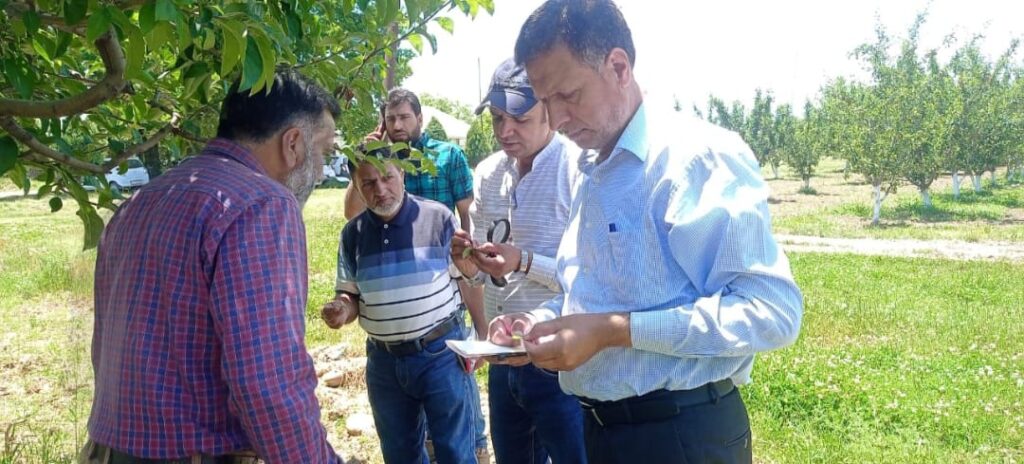Horticulture Department Kashmir & SKUAST-K leaving no stone unturned to contain Apple leaf blotch miner
All types of measures being taken to curb the infestation; no shortage of pesticides required for the management of pest

Orchardists have been requested not to panic & follow the ad hoc advisory framed by SKUAST-K
SRINAGAR, JUNE 16: With the diversification of crops as well as the climate driven changes in pest dynamics, some areas of Kashmir valley especially the districts of south Kashmir, have witnessed the emergence of a new insect pest namely Apple Leaf Blotch Miner.
The pest was reported during the year 2021 from Zainapora and other adjoining areas of district Shopian and can be identified by circular necrotic blotches on apple leaf like Alternaria Leaf spot. During high pest incidence the leaf shows multi spots especially in heavily infested pockets, and trees show a burnt appearance from a distance.
The surveys conducted by SKUAST-K and Department of Horticulture revealed that the pest infestation is prevalent in the orchards of some villages of district Shopian, Kulgam, Anantnag and Pulwama. The economic threshold level of blotch leaf miner is 0.5 to 1 blotch/leaf. Dispersal of blotch leafminer to new areas takes place through infested fruits, Bud/graft wood and plant material.
In order to ensure the containment of any further resurgence and to reduce the intensity of the pest, Financial Commissioner/ Additional Chief Secretary, Atal Dulloo has already instructed SKUAST-K and Department of Horticulture, Kashmir for working out the strategy of its management and to delineate the areas into various infestation zones, such as red, yellow and green depending upon the severity of the infestation, so that the pest can be efficiently managed.
Following the instructions, the Department of Horticulture, Kashmir and SKUAST-K proactively initiated a programme and strategy of damage assessment and management of the pest. The strategy involves not only identification of pest hot spots, but also its possible spread channels, its containment and eradication measures and to prevent an imminent outbreak.
In this respect all the viable means and methods both physical and IT enabled will be put in place. SKUAST-K has already developed google form for receiving the responses from various stakeholders, particularly orchardists regarding the presence and severity of the pest. So far 10,764 responses were received through the google form.
The department of Horticulture and SKUAST-K are pre-emptively following the situation and are leaving no stone unturned to eradicate the pest. The teams of officers from Department of Horticulture, Kashmir and SKUAST-K scientists are regularly visiting the infested areas.
This time also teams of experts are in the orchards of district Kulgam, Shopian and Budgam to provide on the spot advisory and awareness regarding management of the pest to the orchardists. One of the teams visiting District Shopian and Kulgam is being led by Joint Director Horticulture, Kashmir Zahoor Ahmad Bhat.
All types of measures are being taken to curb the infestation. There is no shortage of pesticides that are required for the management of pests as confirmed from Director Agriculture, Kashmir Controller Pesticides. The department of Horticulture, Kasmir, SKUAST-K and Director Agriculture, Controller pesticides are working in cohesion and coordination to control the pest.
This is not the first time that the Orchardists of the valley are confronting the infestation. Some decades back scab had also attained the alarming situation, but through cooperation and coordination of all the stakeholders viz, the department of Horticulture, Kashmir, SKUAST-K and the orchardists, we were able to manage the situation.
This pest will also be brought under control through the integrated and cooperative approach. The results of management strategies are encouraging, as the infestation of Leaf Blotch Miner in the ACDH, Zainapora Shopian has been brought down from 90% during the year 2021 to 10% during current year.
The orchardists are requested not to panic and to follow the ad hoc advisory framed by SKUAST-K and also published by the Department of Horticulture, Kashmir in letter and spirit. By adopting cooperative, integrated and sustained approach we will be able to eradicate the pest.






